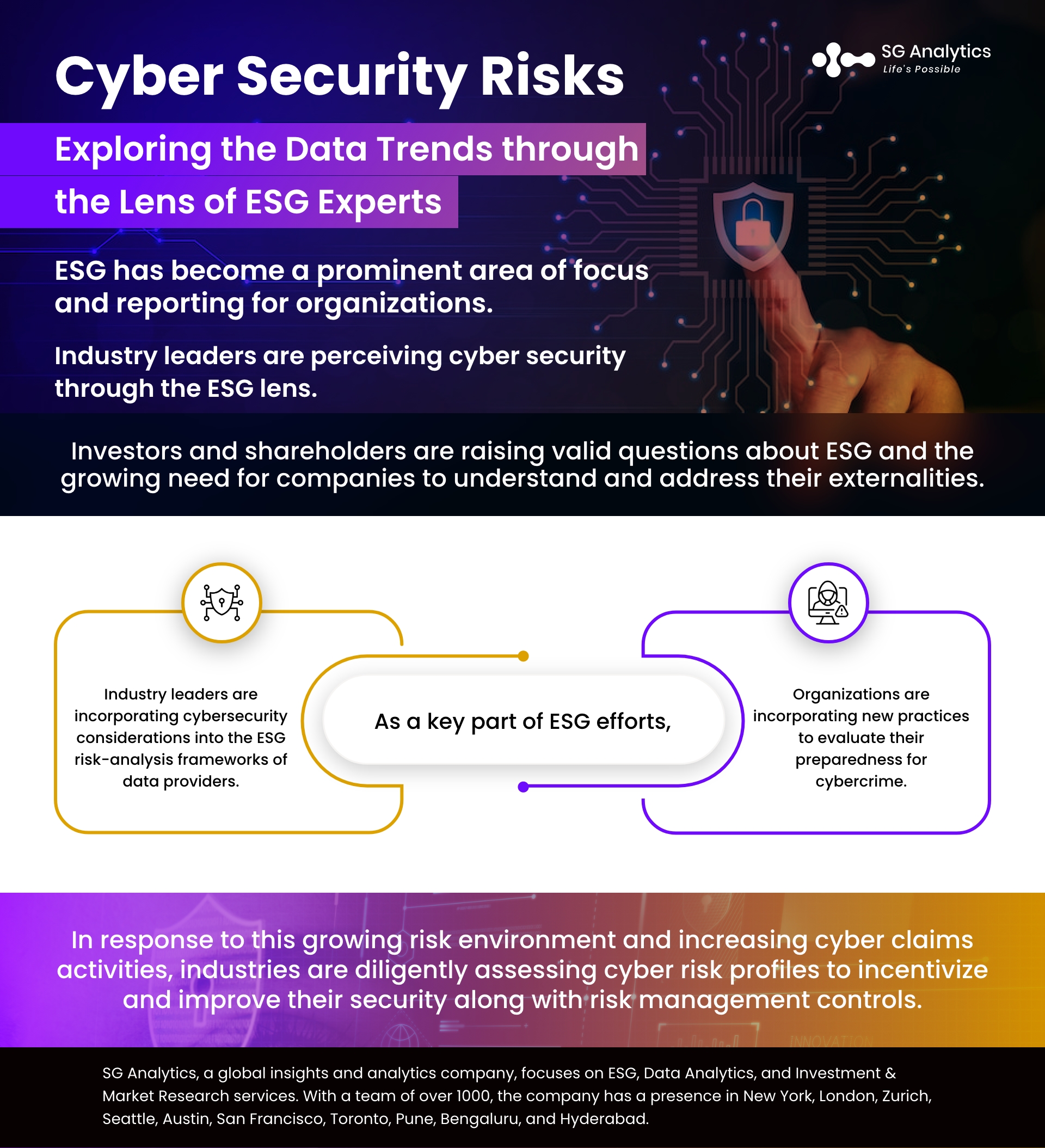ESG has grown to become more than compliance and reporting. Business leaders are elevating their role to drive engagement, foster innovation and enhance operations, thereby unifying the ecosystem to achieve shared strategic goals.
The Growing ESD Data Conundrum
ESG is all about data. Many businesses believe ESG is critical to managing the growing risks, while others perceive it as a component that merely obstructs business. However, the companies are also opening up to the effective use of ESG data to accelerate profitability and growth. Operationalizing ESG data and profitability does not come at odds. Top-performing companies do not make trade-offs based on sustainability, social responsibility, and good governance value. They achieve all the required outcomes at once.
Read more: Deploying Technology to Cultivate a Digital Transformation Strategy that Delivers
ESG data is emerging as a vehicle driving business value and generating insights that create opportunities and boost performance. However, only a few organizations have reached this level. Rather than strategically harnessing the value of ESG data, they are using it as a tool to explore new opportunities for innovation and enhance organizational operations with a narrow focus on meeting compliance demands. To deliver profitable business results, industry leaders are perceiving ESG transparency through a new data lens.

Why is Cybersecurity Vital for ESG?
Cyber security has been perceived as an IT issue, but today’s booming digital economy is hinting that this is no longer the case. The acceleration of digitalization and its far-reaching effects on the potential and actual vulnerabilities exposed by cyber incidents are becoming too apparent, providing a far broader demographic is growing concerned with social impact, including business management, global investors, and stakeholders. It is posing potential exposure to the private information of consumers.
Industry leaders are perceiving cyber security through the ESG lens. Today, companies’ cyber security resilience is scrutinized by stakeholder groups more than in the past. Cybersecurity considerations are being integrated into the ESG risk-analysis frameworks of data providers as companies are incorporating new practices to evaluate their preparedness for cybercrime. In response to this growing risk environment and increasing cyber claims activities, industries are diligently assessing cyber risk profiles to incentivize and improve their security along with risk management controls.
The emerging threats due to the growing reliance on cloud services and evolving third-party landscape implies higher compensation and penalties, which are impacting a shortage of cyber security professionals. Such vulnerabilities indicate that today a company’s cyber security resilience can be scrutinized by more parties than ever before.
Read more: Driving Sustainable Revenue with Product-led Growth

ESG Risk-analysis Frameworks for Data Security
Increasingly, cyber security measures are being incorporated into organizational ESG risk-analysis frameworks of data providers, looking into organizational data protection and information security practices to assess their preparedness for cybercrime. Investors, on the contrary, examine data protection and information security policies to evaluate an organization's cyber security risks.
It is critical to ensure that cyber security processes and policies are well understood across the board level and their cyber risk monitoring frameworks are in place. One of the main complaints many investment communities have is around transparency – it is hard to understand an organization's cyber risks, and for other reasons, many have also been hesitant to provide enough transparency. But the ones that do are certainly witnessing the benefit.
Industry leaders are accelerating security investment. However, many companies are still struggling to employ IT professionals to implement changes at the required pace and scale. Companies that do not recognize these transformations and do not integrate their ESG and cyber security strategies will likely have to deal with a lot more than just a cyber insurance claim in the future.

Building a Responsible and Cyber-aware Workforce
Social engineering today has taken countless forms, emerging as one of the reasons for versatile tactics to infiltrate different organizations. Cybercriminals employ manipulative techniques like email subject lines demanding “urgent” action or coercive messages that threaten legal and professional consequences. When organizations do not have well-trained employees, they are likely to be more susceptible to these deceptions that pose an immediate risk to their employees, customers, and other stakeholders.
Read more: An Ultimate Guide: ESG Data Sources for 2023
In the past few years, industries globally have witnessed a huge influx of cyber scams, serving as a clear reminder that cybercriminals are updating their social engineering strategies depending on opportunities to exploit the vulnerable.
Evolving tactics among cybercriminals, along with surging rates of cyber-attacks, imply companies are becoming more responsible than ever to protect their sensitive information and ensure that their systems aren’t compromised.
Organizations across the globe have never been under more pressure to safeguard profits while maintaining the integrity of sensitive consumer data and essential digital services. As a key part of ESG efforts, organizational leaders are making their SAT performance a critical indicator to protect their employees, customers, and stakeholders.

Key Highlights
-
The growing ransomware attacks are impacting businesses of all sizes.
-
The complexity and frequency of business email compromise attacks are also on the rise.
-
Emerging risk trends such as the heightened risk of state-sponsored attacks and evolving liability landscape are creating a shortage of cyber security and governance under rising ESG scrutiny.
-
Better cyber risks are helping to create a sustainable cyber insurance market.
Read more: Sustainability Outlook: Is ESG an Investment Strategy or a Path to Creating a Sustainable World?
Prioritizing and Navigating ESG Compliance
ESG today has become a prominent area of focus and reporting for organizations across the globe. Industry leaders are analyzing their practices through the environmental, social, and governance (ESG) lens. They are opening the aperture of success metrics by including how their everyday activities positively or negatively impact society. And with consumers showing concerns about how their personal data is being used, there is a growing awareness about the different cyber-attack and data security vectors.

Cybersecurity is a critical component of any company’s ESG strategy. From the protection of sensitive consumer data to the adherence to data privacy laws and regulations, a robust cybersecurity platform is crucial to meet basic ESG criteria. While many organizations believe cybersecurity is all about firewalls and digital infrastructure, a well-trained workforce is truly a company’s most significant cybersecurity asset. This is because the number of cyberattacks relies on social engineering - the deception and manipulation to infiltrate an organization. Most cyber-attacks are preventable with the right information. It is, therefore, important for organizations to integrate an effective security awareness training (SAT) program to reduce attacks on their organization’s digital infrastructure.
Investors and shareholders are raising valid questions about ESG and the growing need for companies to understand and address their externalities. It is becoming a critical component to maintaining their social license. While the rising profile of ESG has been evident in investments, the rate of new investments has been falling.

Cybersecurity risk stands as a top threat to organizational growth—risk consumers and investors are slowly learning to take more seriously by the day. Beyond the broad range of governance implications, cybersecurity is crucial today as consumers are extremely worried about how the accumulated personal data is being stored and used. It is a powerful reminder for companies to establish comprehensive and transparent data privacy and security policies, as well as data frameworks capable of keeping the company safe
With a presence in New York, San Francisco, Austin, Seattle, Toronto, London, Zurich, Pune, Bengaluru, and Hyderabad, SG Analytics, a pioneer in Research and Analytics, offers tailor-made services to enterprises worldwide.
A leader in ESG Services, SG Analytics offers bespoke sustainability consulting services and research support for informed decision-making. Contact us today if you are in search of an efficient ESG integration and management solution provider to boost your sustainable performance.









